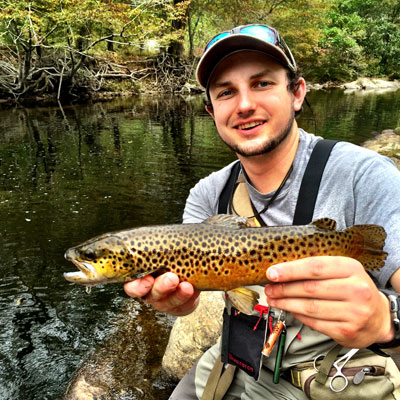 Fly Fishing in the Winter
Fly Fishing in the Winter
By Ethan Hollifield
As winter approaches us here in the High Country, it brings with it the anticipation of solitude and peace that an angler can find only during the coldest of days on a trout stream. Often, the biggest challenge many face when braving the elements is not finding or catching active fish, but rather staying warm enough for an extended period of time for it to be enjoyable. I’ve spent many miserable days on the water battling numb hands and iced up rods. I learned more growing up, and later through my guiding career, about how to NOT stay warm, and hopefully these tips I’ve learned through my own shortcomings will help you stay warmer while enjoying the great fishing offered during a Southern Appalachian Winter.
Invest in quality winter clothing. If the temperature is forecasting highs around 45 degrees or less, you have to be prepared for a potentially cold day on the water. I normally start out with a fleece, base layer, paired with knee high wool socks. My next layer is a pair of heavy cotton sweatpants or lined guide pants (again, for ease of movement) along with a polyester sweater, sweatshirt, or windbreaker. I’ll then follow with a quality water resistant shell jacket with a hood and neck guard to keep rain, snow, sleet, and wind off. Your head is where you will lose a good portion of the heat that your body produces, and a good wool or fleece beanie, facemask, and wind proof buff will enable you to retain as much body heat as possible. I’ve been conflicted on gloves for fishing and I still haven’t found a pair that I can fish in without, inevitably, getting them wet, which results in hands becoming unusable. Rather, carrying one or two dry rags inside of your waders, and within easy reach to wipe your hands on, keeps your hands drier and warmer throughout the day. Save your gloves for when you’re out of the water. I carry several hand warmers while I’m out, to place in the pockets of my wading jacket, which offer my hands a break from the cold. Also, keep in mind that darker colors absorb and hold more heat, so aim for wearing those on your colder days out on the water. Always bring a spare change of clothes with you just in case of an accidental slip into the water from an icy rock.
My final piece of advice, as a guide, is that if you start feeling too cold, take a break for yourself to warm up out of the water. There isn’t a fish in the world that is worth putting yourself at risk of hypothermia. Your body produces heat during digestion as well, so I always carry snacks and a large thermos of coffee while I’m out on the water (a flask of bourbon also works wonders in moderation, if that is your preference). Keeping yourself as comfortable as possible is one of the biggest factors to success when fishing under these conditions. This time of year can hold some of the best fishing Western North Carolina has to offer, and following these tips on staying warm on the water will allow you to experience it for yourself.
 Fly Fishing in the Winter
Fly Fishing in the Winter